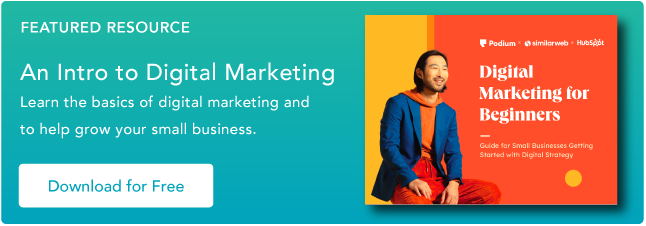Welcome to Creator Columns, where we bring expert HubSpot Creator voices to the Blogs that inspire and help you grow better.
Mistakes are part of the journey for every digital course creator, and trust me, I’ve made my fair share of them as I’ve built my business. But for every one of these missteps, there’s been a valuable lesson.
My name is Amy, and I help entrepreneurs grow their businesses with digital courses. So I’d love to walk you through some of the lesser-known mistakes I’ve made, so you can avoid them entirely. Sound good?
The 7 Biggest Mistakes I’ve Made as a Digital Course Creator
1. Launching without hands-on experience
While your digital course topic may evolve with your business, it’s important to have hands-on experience in whatever it is you’re teaching.
Want to teach a course about real estate investing? Fantastic, but make sure you have experience as a real estate investor. Want to teach hair stylists how to successfully open their own salons? Do it. But you should have opened your own salon first.
I launched my first digital course without any prior experience in the niche I was teaching about. In my hurry to establish myself as an expert, I overlooked the importance of having hands-on experience. Can you guess how this turned out? Yep, my first course was a total flop.
Beyond the obvious, here are a few reasons why you should get some hands-on experience in your niche before launching a course:
- Credibility: To build trust with your future students, you need to show them that you’re the real deal. Having actual experience in the subject matter is the first step to gaining their confidence.
- Effective Teaching: When you have demonstrated experience, your teaching becomes more powerful. You can relate to the challenges your students might face and provide practical, real-world solutions for them.
- Problem Solving: As an experienced practitioner, you’ve likely encountered and conquered the hurdles in your field. This experience allows you to anticipate the common issues your students might encounter and equip them with solutions — kind of like what I’m doing in this blog post.
- Confidence: When you’ve been through it and come out the other side successfully, it boosts your confidence as a teacher. Confidence helps you present information with clarity and assertiveness, inspiring your students to trust your guidance.
- Building a Reputation: Over time, your reputation as an expert in your field grows, opening up new opportunities like speaking engagements, collaborations, and consulting. It can also pave the way for a dedicated and loyal audience.
You don’t need to be the leading expert in your field, you only need what I like to call a 10% edge. However, you should have hands-on experience to draw from before you build a digital course.
2. Letting Imposter Syndrome Rule
Even when I had relevant knowledge, I struggled with imposter syndrome. I doubted my ability to teach, and I questioned what others might think. Ultimately, this slowed down my progress.
Here are a few tips you can use to overcome imposter syndrome:
- Embrace your wins: Remind yourself of your accomplishments and successes, no matter how small they may seem.
- Focus on progress, not perfection: Perfection isn’t attainable. Strive for continuous improvement, instead.
- Practice self-compassion: Be kind to yourself, recognizing that everyone has moments of doubt.
- Keep a “brag file”: Document praise and positive feedback to counter imposter feelings.
Many people let their lack of marketing or technology experience hold them back from course creation. Trust me, you don’t need to be a digital whiz to be successful.
Heck, you don’t even need to have your course topic idea perfected before you get started! That’s what resources like Digital Course Academy (DCA) are for. DCA provides a complete roadmap for validating, creating, launching, and selling your digital course.
3. Creating a Course I Wasn’t Passionate About
Talk about a waste of time and resources. I once created a course on a topic I’d lost interest in, and I never ended up launching it.
Before you get into course creation mode, it’s essential to find your “sweet spot.” This is where your course aligns with your passion, your audience’s needs, and your expertise. In other words, you’ve got to discover what ‘your thing’ is. This ensures you remain motivated and can deliver on your topic with enthusiasm.
4. Spending Too Much Time Outside of Your ‘Zone of Genius’
Your Zone of Genius is where you deliver the most value. It’s typically a combination of:
- Your Passion: What you’re deeply passionate about and genuinely love doing.
- Your Skills: Where you excel and have honed your expertise through learning and doing.
- Your Impact: Where your talents and passion intersect with what your audience needs.
As an entrepreneur, you’re spinning a lot of plates. It’s easy to spend time on things outside your Zone of Genius. For example, I spent years editing course videos when I could have delegated the task and spent more time on higher-value tasks.
Don’t fall into this trap. As your business grows, outsourcing tasks that aren’t the highest use of your time frees you up to focus on more critical aspects of your business.
5. Thinking My First Course Was The End-All-Be-All
I definitely made this digital course mistake in the beginning. It was like my course had to be the masterpiece of every course ever created. I threw everything I knew and the kitchen sink into it because I wanted to prove how knowledgeable I was.
Here’s the truth: Your first course doesn’t need to be everything.
Your courses can evolve and improve over time. Don’t aim for perfection. Focus on delivering value, and enhance your course with each iteration.
Remember: All you need to do is create one digital course to be profitable. The key is to improve your course with each relaunch.
6. I Played It Too Small
Have you ever heard the phrase “Go big or go home?” That should definitely apply to your digital course launch.
If you’re playing small by just sending a few emails, doing a mini-launch, or skipping social media or webinars because you’re ‘not ready,’ you’re only delaying your success.
In my early days, I played it safe with my course launches. I only sent a few emails, and I refused to show up on video because I wasn’t comfortable.
Video is a powerful tool for connecting with your audience, and it’s a critical aspect of growing your business and selling your course. Don’t do what I did and wait too long to put yourself out there.
Start small, practice, and gradually increase your presence. When you’re ready to launch, you’ll be comfortable playing in the big leagues.
7. Not Nurturing My Audience Enough
Speaking of launches, your email list is one of your most valuable assets, and neglecting it can severely hurt your launch results. Consistently engage with your subscribers, offer valuable content, and build a relationship with them over time.
By the way, if you think your email list is too small to launch your digital course, think again. One of the biggest things I’ve learned is that you don’t need a huge email list to have a successful launch. I’ve had clients with only 120 email list subscribers earn thousands of dollars in just a few days.
If you’ve engaged with your email list, the response will be much better when you actually launch your course.
In fact, having a highly intentional onboarding process — or getting your audience excited about your topic ahead of time — is essential for a successful launch. I found this out the hard way after having a few Masterclasses with dismal attendance rates.
Don’t make the same mistake I did. Engage your registrants before your course launch to get them excited.
You’re Ready to Build A Successful Digital Course
Alright, you’ve learned the bad and the ugly. It’s time for you to implement the good and build a highly successful digital course.
Remember, it’s a journey filled with valuable lessons, so keep learning as you keep growing. Now, go out there and create a profitable and enjoyable business that exceeds your wildest expectations.
If you want guidance from someone who’s gone before you, come join me in Digital Course Academy.

![]()




